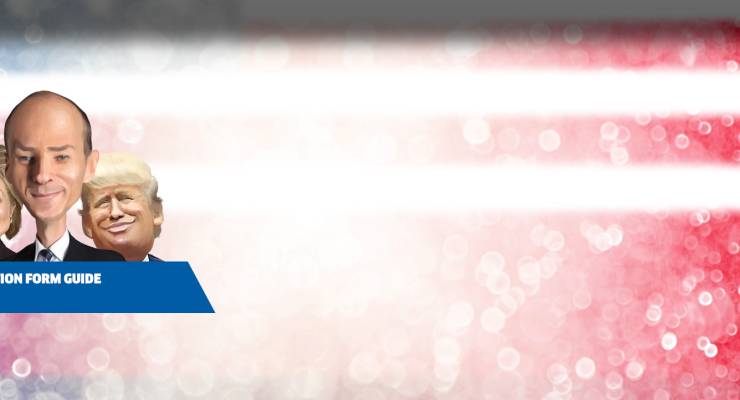
With the last of three debates to be held from noon today Sydney and Melbourne time, the most bitter and divisive United States presidential election of modern times is finally entering the home straight.
The campaign has hardly caught American democracy in the most flattering light. But the public, like rubber-neckers at the scene of a car accident, have been finding it impossible to look away.
Even without allowing for those who watched it online, the first debate on September 26 drew a record-breaking television audience of 84 million. While second and third debates traditionally do less well, today’s finale should still reach upwards of 70 million.
So far, the attention has been a boon for Hillary Clinton, who emerged the clear winner of both debates as judged by polls conducted for CNN — first by a margin of 62% to 27%, then by 57% to 34%.
Betting markets are finding no reason to expect different this time. Sportsbet is offering $1.15 on Hillary Clinton again being judged the winner in the post-debate (CNN) poll compared with $3.75 for Donald Trump. Some 80% of the money coming in has been for Clinton.
How much difference all this will end up making on November 8 is another question.
History suggests debates actually have little lasting impact on poll numbers, although there have been a few noteworthy exceptions.
In 1960, the very first debate of the television age decisively tipped the scales of a close election in favour of a polished and confident John F. Kennedy over a visibly perspiring Richard Nixon. So much did this debate become a part of American political folklore that it was parodied three decades later on The Simpsons.
Clinton’s emphatic win on September 26 might also be thought to qualify, given the tailspin Trump’s poll numbers went into immediately afterwards.
However, it will never be known how much this was down to the debates, and how much to Trump’s eccentric vendetta against former Miss Universe Alicia Machado, followed by the explosive emergence of the Access Hollywood “grab her by the pussy” tape on October 7.
Another possibility is that none of the campaign’s sound and fury has really signified all that much, and that voters have merely hardened in their existing perceptions of candidates who have both been in the public eye for many long years. Certainly that’s how it appears when their current polling numbers are compared with those from January.
While there has been some volatility as the deficiencies of one candidate or the other have come and gone from the media spotlight, the weight of evidence suggests Clinton has all times held the lead, which has settled in at around 5% to 6% during quieter periods.
However, there is still one hook left for Trump to hang his hopes on: the possibility that the polls are systematically wrong.
The experience of the British general election in May last year, when pollsters spoke with one voice in crediting David Cameron’s Conservatives with a vote share 6% below what they actually achieved, suggests it can’t be entirely ruled out.
A post-mortem by the British polling industry concluded that one of the problems was “herding”, whereby pollsters who found themselves out of step with their rivals tweaked their methodologies to bring their results in line with the others.
The possibility of something similar happening in the US is why it still makes sense for election forecasters such as Nate Silver’s FiveThirtyEight and The New York Times’ The Upshot to credit Trump with a roughly 10% chance of winning, despite calculating Clinton’s poll lead at around 49% to 42%.
Betting markets reflect this too, with Sportsbet’s offer on a Clinton victory stabilising over the past week at around $1.14, while allowing $5.20 for a Donald Trump long shot.







While I have heard discussion of the “herding” factor amongst polling companies as a factor in the poor performance of polling in the 2015 UK elections there are several other factors of equal importance. Firstly there is the “shy” tory factor – a key factor in poor polling predictions of the 1992 elections and perhaps even in understating Tory majorities during the Thatcher era. Secondly the 2015 election saw watershed changes in political allegiences in the UK with Labour losing nearly all their Scotish seats, the near extermination of the Lib Dems and finally the significant rise in voter support for UKIP and the UK Greens. These factors are not present in the US Presidental elections. Nevertheless I can imagine that there might be registered voters who might vote for Trump but be shy of disclosing the fact – I know I wouldn’t admit it.